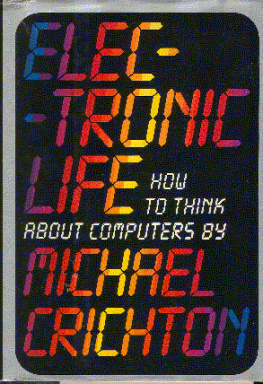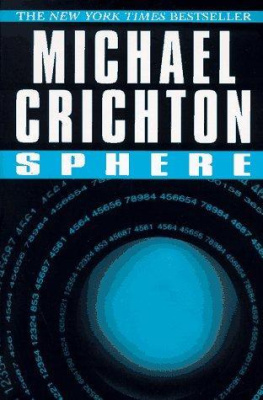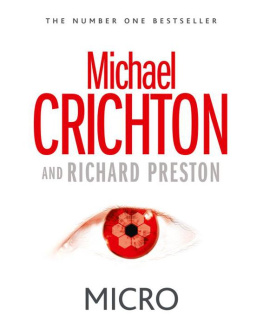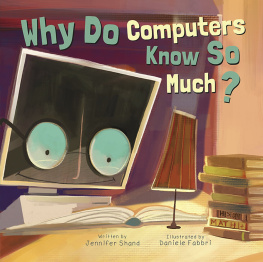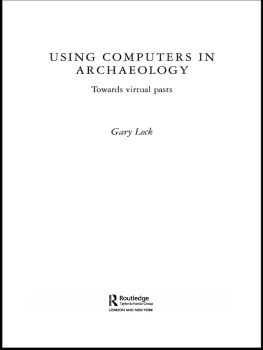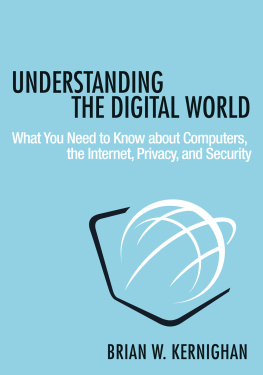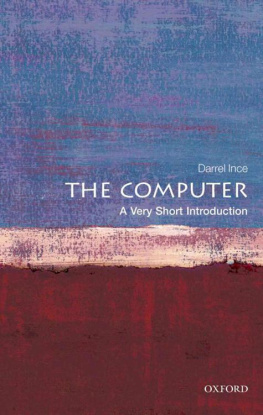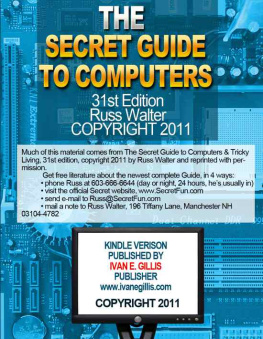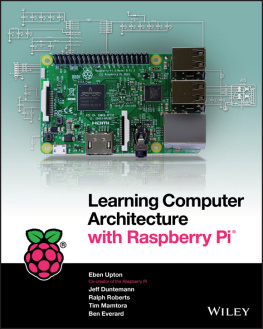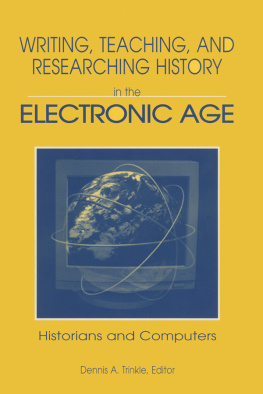Michael Crichton - Electronic Life: How to Think About Computers
Here you can read online Michael Crichton - Electronic Life: How to Think About Computers full text of the book (entire story) in english for free. Download pdf and epub, get meaning, cover and reviews about this ebook. year: 1983, publisher: Random House Inc, genre: Art. Description of the work, (preface) as well as reviews are available. Best literature library LitArk.com created for fans of good reading and offers a wide selection of genres:
Romance novel
Science fiction
Adventure
Detective
Science
History
Home and family
Prose
Art
Politics
Computer
Non-fiction
Religion
Business
Children
Humor
Choose a favorite category and find really read worthwhile books. Enjoy immersion in the world of imagination, feel the emotions of the characters or learn something new for yourself, make an fascinating discovery.
- Book:Electronic Life: How to Think About Computers
- Author:
- Publisher:Random House Inc
- Genre:
- Year:1983
- Rating:3 / 5
- Favourites:Add to favourites
- Your mark:
- 60
- 1
- 2
- 3
- 4
- 5
Electronic Life: How to Think About Computers: summary, description and annotation
We offer to read an annotation, description, summary or preface (depends on what the author of the book "Electronic Life: How to Think About Computers" wrote himself). If you haven't found the necessary information about the book — write in the comments, we will try to find it.
Electronic Life: How to Think About Computers — read online for free the complete book (whole text) full work
Below is the text of the book, divided by pages. System saving the place of the last page read, allows you to conveniently read the book "Electronic Life: How to Think About Computers" online for free, without having to search again every time where you left off. Put a bookmark, and you can go to the page where you finished reading at any time.
Font size:
Interval:
Bookmark:
Electronic Life
How to think about computers
By Michael Crichton

FICTION
The Andromeda Strain
The Terminal Man
The Great Train Robbery
Eaters of the Dead
Congo
NON-FICTION
Five Patients
Jasper Johns
Electronic Life
THIS IS A BORZOI BOOK
PUBLISHED BY ALFRED A. KNOPF, INC.
Copyright 1983 by Michael Crichton
All rights reserved under International and Pan-American copyright Conventions. Published in the United States by Alfred A. Knopf, Inc., New York, and simultaneously in Canada by Random House of Canada Limited, Toronto. Distributed by Random House, Inc., New York.
Grateful acknowledgment is made to the following for permission to reprint from previously published material:
Alfred A. Knopf, Inc.: Excerpts from Tao Te Ching, by Lao Tsu, translated by Gia-fu Feng and Jane English. Copyright 1972 by Alfred A. Knopf, Inc. Used by permission of Alfred A. Knopf, Inc.
W. H. Freeman and Company: Short excerpt from Weizenbaum, Computer Power and Human Reason, which originally appeared in Computer Models of Thought and Language by Roger C. Schank and K. M. Colby, eds. Copyright 1975 by W. H. Freeman and Company. All rights reserved.
Library of Congress Cataloging in Publication Data
Crichton, Michael, [date] Electronic life.
Bibliography: p.
1. Microcomputers. I. Title.
QA76.5.C74 1983 001.64 83-48022
ISBN 0-394-53406-9
Manufactured in the United States of America
FIRST EDITION
Acknowledgments
1. Electronic Life
2. Practical Matters A to Z
Apple Appendix (NOT INCLUDED)
BM Appendix (NOT INCLUDED)
Grouchy Glossary
Bibliography
Twenty years ago, my first experience with computers occurred while I was a student of William Howells at Harvard. Because Howells treated these machines with good sense and good humor, I did, too. Howells regarded computers as a useful, sometimes exasperating tool, but he felt that to indulge fears about them was a waste of time. I can trace nearly all the attitudes expressed in this book to his own remarkably prescient views.
More recently, with the advent of small machines, many others have assisted me. Paul Bass, David Shire, Jim Leitzke, Stacy Keach, Andrew Grove, Ron Frankel, Clay Serbin, and Stephen Warady all helped me in innumerable ways.
I'd never have written a book had not Jack Roberts invited me to attend the International Design Conference in Aspen in June 1982. Jerry Lettvin was there; he proposed I write on this subject. Informal talks with other conference participants greatly influenced the shape of the text.
While preparing manuscript drafts, I received valuable suggestions from Caroline Ray, Lisa Faversham, Mike Rachmil, Kurt Villadsen, and Suzanne Crichton. Several of the people already mentioned read various drafts as well. Joseph Esherick translated the "I Ching" hexagram names. Bob Gottleib pulled the manuscript together with his usual apparent effortlessness.
Joseph Weizenbaum, Jerry Lettvin, Gloria Minsky, and Marvin Minsky reviewed the manuscript in its final stages and suggested important clarifications and additions.
I'm very grateful for all this help; whatever errors remain in the text are my own.
This is a book about people and computers. It proceeds from several fundamental assumptions:
1. People are more important than computers.
2. Much of what we believe about computers is wrong.
3. It is easy to use a computer.
4. This is fortunate, because everybody's going to have to learn.
5. It is not so easy to use a computer wisely.
6. This is unfortunate, because everybody's going to have to learn.
7. Computers can actually be a lot of fun.
8. There are people who want to put a stop to that.
The proliferation of computers in recent years has been truly phenomenal. In 1978, there were about 5,000 desk-top computers in the United States. In 1982, there were 5. million. In 1980, there were 350,000 computer terminals communicating with a large machine elsewhere; by 1982, there were 3 million such terminals. By 1990, it is estimated there will be 80 million desk-top computers in the United States. By then, if you count microprocessors in weapon systems and home appliances, there will be a billion computers throughout the world. These small, cheap powerful devices will be everywhere, and they will have altered every aspect of human life, from the way we run our societies to the way we run our personal lives.
This may not be welcome news.
Industrial societies in the twentieth century have already undergone several revolutions in life-style as a result of new technologies, but these revolutions are now clearly perceived as mixed blessings. Even the most exhilarating single moment of twentieth-century technologylanding a man on the moonis now perceived for what it was, the first giant step in the systematic militarization of space. And the nuclear power controversy in the United States is only comprehensible as a debate over whether our society should move in the direction of more technology or not. At the moment, our disaffection with technology seems to be so complete that even environmentalists prefer acid rain to nuclear waste.
But in our disillusionment, it's worth remembering that the virtues of the technological future have been consistently oversold often by the technologists, always by the press, and frequently by consumers themselves. Technology hype has been a feature of Western life for more than a century. But the technology doesn't create its own hype. We do it to ourselves, and if we're now disappointed or feel we've made wrong choices, we have only ourselves to blame.
Second, there are plenty of places left in the world where one can live a nineteenth-century life, an eighteenth-century life, or even a tenth-century lifebut few people rush to live in them. Even the most disillusioned offspring of industrial society gets a rude shock on learning what the pre-technological world is really like.
The fact that industrial technology has been transformed from a problem-solving panacea to a problem-in-itself reveals more about us than it does about technology. If we are now inclined to view technology as a mixture of good and bad, advantage and disadvantage, cost and benefit, it simply means that we have adopted a more mature view. We've grown up a little.
Taking responsibility for choices is especially important when we think about computers, because computers are going to be in everyone's handslike handguns. This makes computers a rather different kind of technology.
In contrast, consider automobiles. The technology of personal transportation doesn't allow the individual much freedom. You can't make your own automobile; design and manufacture are controlled by large corporations. You can't use an automobile without a road; road construction is controlled by governments. With an automobile your effective choices boil down to trivial matters such as cosmetic styling and accessories.
Similarly, mass-communications technology is out of your control. You can't easily create your own newspaper or television program; as an individual, you are effectively limited to complaining about large corporations that do.
And in many other areas of technology, we as individuals have come to recognize that we are powerless to control or shape the way technology is used. Like children with seemingly omnipotent parents, we must do as we are told. We are outsiders, resigned to that role. We can snipe at technology, but we can't really do anything about it.
Next pageFont size:
Interval:
Bookmark:
Similar books «Electronic Life: How to Think About Computers»
Look at similar books to Electronic Life: How to Think About Computers. We have selected literature similar in name and meaning in the hope of providing readers with more options to find new, interesting, not yet read works.
Discussion, reviews of the book Electronic Life: How to Think About Computers and just readers' own opinions. Leave your comments, write what you think about the work, its meaning or the main characters. Specify what exactly you liked and what you didn't like, and why you think so.

